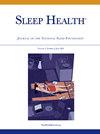小睡、睡眠和对晚睡和短睡青少年的影响:一项活动记录仪和日常日记研究。
IF 3.4
2区 医学
Q2 CLINICAL NEUROLOGY
引用次数: 0
摘要
目的:美国的青少年由于生理成熟、学术和社会责任等因素的综合作用,通常无法在晚上获得足够的睡眠。睡眠不足会导致认知、心理和身体健康状况不佳。小睡可以弥补睡眠不足,然而,随着时间的推移,对于睡眠不好的青少年,午睡是如何影响夜间睡眠和情绪的,我们知之甚少。方法:本研究使用15天内收集的晚睡和短睡青少年的日常日记和活动记录仪数据(n=99;法师= 15.9年;55%的女性;46%白人,30%黑人,24%多种族/其他)。在控制前一晚睡眠的情况下,利用多水平模型来检查白天小睡和随后的夜间睡眠结果之间的日常关联。性被视为一个调节因素。结果:大多数参与者(76%)在研究期间至少打过一次盹,近五分之一的样本表现出“习惯性”或频繁的午睡。午睡与总睡眠时间减少27分钟以及当晚睡眠开始时间推迟有关。午睡时间越晚,夜间睡眠开始时间越晚,午睡时间越长,夜间睡眠开始时间越晚,睡眠效率越低。午睡与情绪无关。性并没有缓和小睡和夜间睡眠或影响之间的关系。结论:研究结果表明,在晚睡和短睡的青少年样本中,午睡很常见,通常与较差的夜间睡眠结果有关。本文章由计算机程序翻译,如有差异,请以英文原文为准。
Napping, sleep and affect in late- and short- sleeping adolescents: An actigraphy and daily diary study
Objectives
Adolescents in the United States do not typically attain enough sleep at night due to a combination of factors, including biological maturation and academic and social commitments. This lack of sleep leads to poor cognitive, mental, and physical health outcomes. Naps may compensate for inadequate sleep, however, little is known about how napping affects nocturnal sleep and mood over time among adolescents who are poor sleepers.
Methods
The present study used daily diary and actigraphy data collected over 15 days in a sample of late- and short-sleeping adolescents (n = 99; Mage = 15.9 years; 55% Female; 46% White, 30% Black, and 24% Multiracial/Other). Multilevel modeling was utilized to examine daily associations between daytime napping and subsequent nocturnal sleep outcomes, controlling for previous night sleep. Sex was explored as a moderator.
Results
The majority of participants (76%) napped at least once during the study period, and almost one-fifth of the sample demonstrated “habitual” or frequent napping. Nap occurrence was associated with a decrease in total sleep time by 27 minutes as well as later sleep onset time that night. Later nap offset time was associated with later nocturnal sleep onset time, and longer nap duration was associated with later nocturnal sleep onset time and lower sleep efficiency. Napping was unrelated to affect. Sex did not moderate any relations between napping and nocturnal sleep or affect.
Conclusions
The findings indicate that napping is common and generally associated with worse nocturnal sleep outcomes among a sample of late- and short-sleeping adolescents.
求助全文
通过发布文献求助,成功后即可免费获取论文全文。
去求助
来源期刊

Sleep Health
CLINICAL NEUROLOGY-
CiteScore
6.30
自引率
9.80%
发文量
114
审稿时长
54 days
期刊介绍:
Sleep Health Journal of the National Sleep Foundation is a multidisciplinary journal that explores sleep''s role in population health and elucidates the social science perspective on sleep and health. Aligned with the National Sleep Foundation''s global authoritative, evidence-based voice for sleep health, the journal serves as the foremost publication for manuscripts that advance the sleep health of all members of society.The scope of the journal extends across diverse sleep-related fields, including anthropology, education, health services research, human development, international health, law, mental health, nursing, nutrition, psychology, public health, public policy, fatigue management, transportation, social work, and sociology. The journal welcomes original research articles, review articles, brief reports, special articles, letters to the editor, editorials, and commentaries.
 求助内容:
求助内容: 应助结果提醒方式:
应助结果提醒方式:


